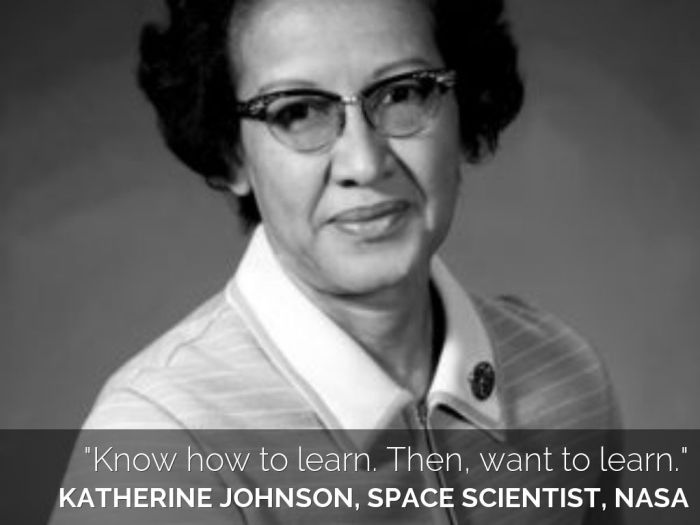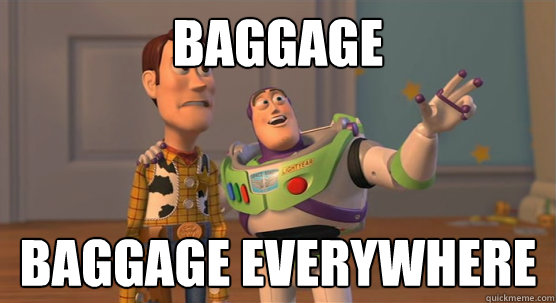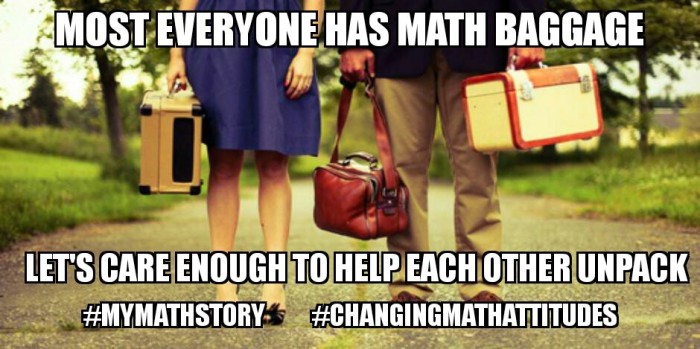THE BAD
Here is a sad but true #MyMathStory for you:
Once upon a time, a young girl was great at math. She was in gifted and accelerated classes, loved to learn, and very confident in her abilities. This was her attitude and ability in elementary school and most of junior high school.
Then something changed.
One day in math class, she didn’t understand a concept. This was a very rare thing for her; she didn’t know how to be wrong or fail. After some deliberation, she finally got up the courage to ask her teacher for help.
His response was that she was just a stupid girl and would never be good at math.
Ouch.
Even after years of success and confidence, this one experience ruined her with math. Completely. Twenty years later, she still admittedly suffers from math anxiety, and it absolutely stunted her math growth for the rest of her schooling and beyond.
I could talk here about resilience or overcoming failure, but none of that was the case in this situation. What baffles me is that a teacher said that. Even if we give him the benefit of the doubt that he was just joking, the damage was the same. Someone in a position of mentorship like this (teacher, parent, etc.) should never say something so terrible. Ever.
I wonder where he got his attitude? I wonder if it was something he developed himself, or if it was passed on to him by a previous parent or teacher. I wonder if he had females in his math teaching program in college. I wonder if he had female math teacher colleagues in his department. I wonder if he had been bested by a girl at some time. In other words, I wonder what math baggage he had personally that contributed to his belief.
Seeing him from this perspective humanizes him just a bit, doesn’t it? It’s not an excuse for bad behavior, but it might be a reason. And it might give us a clue on how to combat such beliefs.
Many stereotypes have changed over time, but others are absolutely in full force. Some are political and outright, while others are more subtle.
Here are a few unproductive stereotypes that have to be changed:
- girls are bad at math
- people with disabilities will never be able to do math
- parents who are bad at math will have kids who are bad at math
- math isn’t necessary for life
- old math is better than new math
- the way I learned math years ago is better than how it is taught now
- you are either a math person or you aren’t
- math abilities are fixed and cannot be improved
- if you are good at math you are a nerd
And the list goes on.
The bottom line: part of #ChangingMathAttitudes is changing math stereotypes.
But what can we do?
THE GOOD
Since I don’t want to be all doom-and-gloom, I am excited to share something positive that actually prompted me to write this post. I was at a movie with my family, and one of the trailers before was of a story I had never heard of before. “Hidden Figures” is inspired by a true story about a woman named Katherine Johnson who quietly did the math necessary to send (and return!) the first men safely into space. Here is the trailer:
Not one to believe everything Hollywood puts out (winky face!), I did a little research to find out how accurate it is. While the plot might not be perfect, the main point seems to be legitimate. I found a great bio about her on the NASA website. Additionally, below is a little featurette documentary:
As an African American woman, she had a whole bunch of stereotypes to fight against. Why haven’t I heard about this story til now? I don’t know, but I am glad it is coming to light. I can’t wait to see the movie, and I am hoping to read the book soon. If you already have read it, please let me know what you think!
The point is that Katherine Johnson was certainly not “just a stupid girl who would never be good at math.” The teacher I talked about in the beginning must not have ever heard her story either.
Thank you, Katherine, for smashing so many stereotypes.

~~~Remember, math skills won’t improve until math attitudes do!~~~
We can make a difference. We have to make a difference. It might be in our family, it might be in our students, it might be in our community, and it might even be in ourselves.
Here’s to our efforts!
Cheers,
Adam
__________________
Be a friend and follow me!
WordPress: https://changingmathattitudes.wordpress.com/
Facebook: https://www.facebook.com/groups/1653035008300751/
Help me out! What are some other stereotypes I have missed? What are some examples you have seen? What can we do to combat them? Please share this story and post in the comments below!


